FAOF Year 3 Management Accounting for Control (MAC) Research Report
VerifiedAdded on 2019/09/13
|11
|2497
|427
Report
AI Summary
This assignment report delves into the realm of Management Accounting for Control (MAC), focusing on the critical role of the management accountant in providing decision-support information for financial planning and control. It explores the processes of short-term financial planning, including budgeting, coordination across business functions, and the impact of budget constraints. The report also examines long-term financial planning through capital investment appraisal, emphasizing the importance of relevant cash flow data and techniques like net present value (NPV). Furthermore, it analyzes the role of management control decision-support information, including variance analysis and control activities. The assignment requires a group investigation and assessment of academic research on management control systems, with individual components focusing on an overview of the research, the tests and findings, and a critical assessment of the research's aims. Finally, the report includes a reflective discussion on personal learning and development throughout the assignment process.
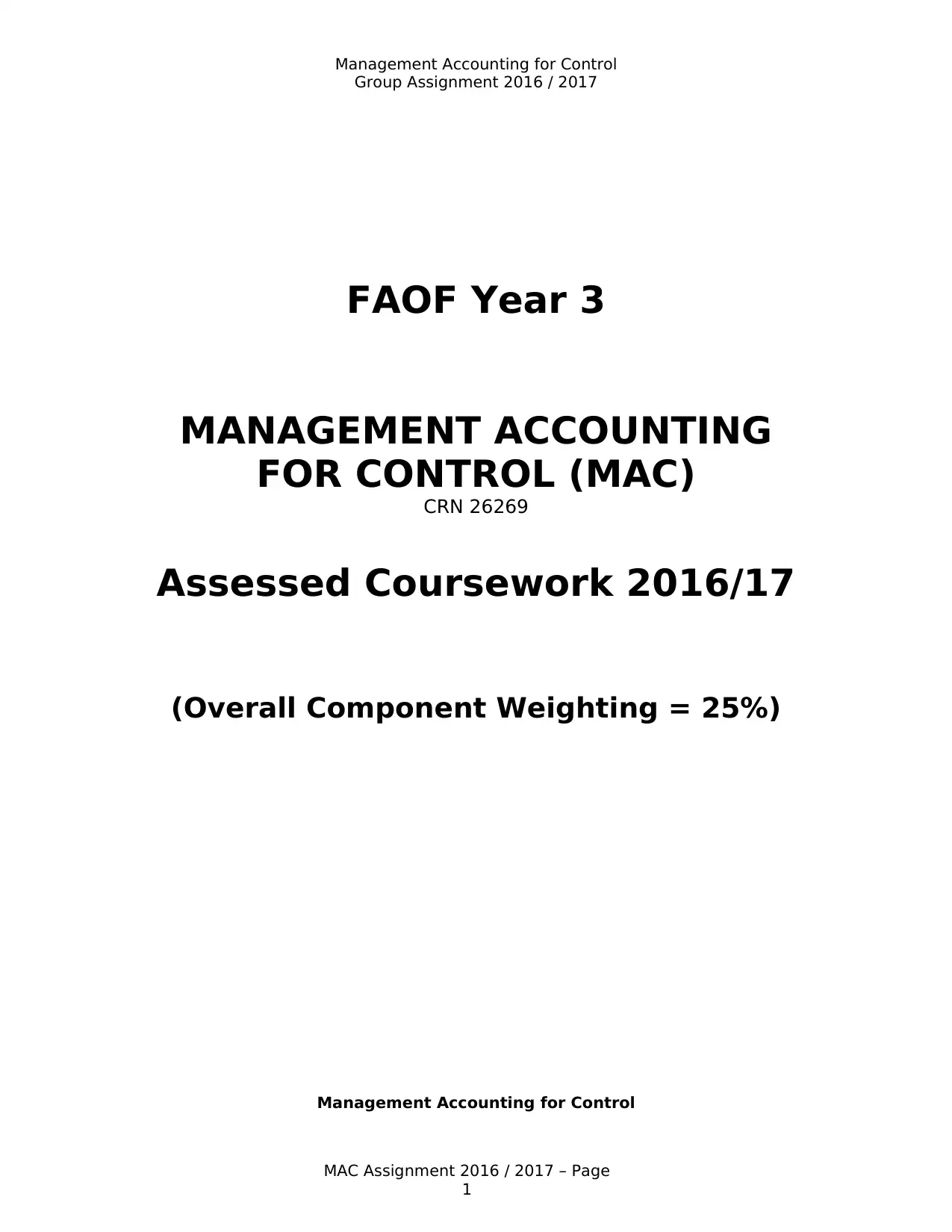
Management Accounting for Control
Group Assignment 2016 / 2017
FAOF Year 3
MANAGEMENT ACCOUNTING
FOR CONTROL (MAC)
CRN 26269
Assessed Coursework 2016/17
(Overall Component Weighting = 25%)
Management Accounting for Control
MAC Assignment 2016 / 2017 – Page
1
Group Assignment 2016 / 2017
FAOF Year 3
MANAGEMENT ACCOUNTING
FOR CONTROL (MAC)
CRN 26269
Assessed Coursework 2016/17
(Overall Component Weighting = 25%)
Management Accounting for Control
MAC Assignment 2016 / 2017 – Page
1
Paraphrase This Document
Need a fresh take? Get an instant paraphrase of this document with our AI Paraphraser
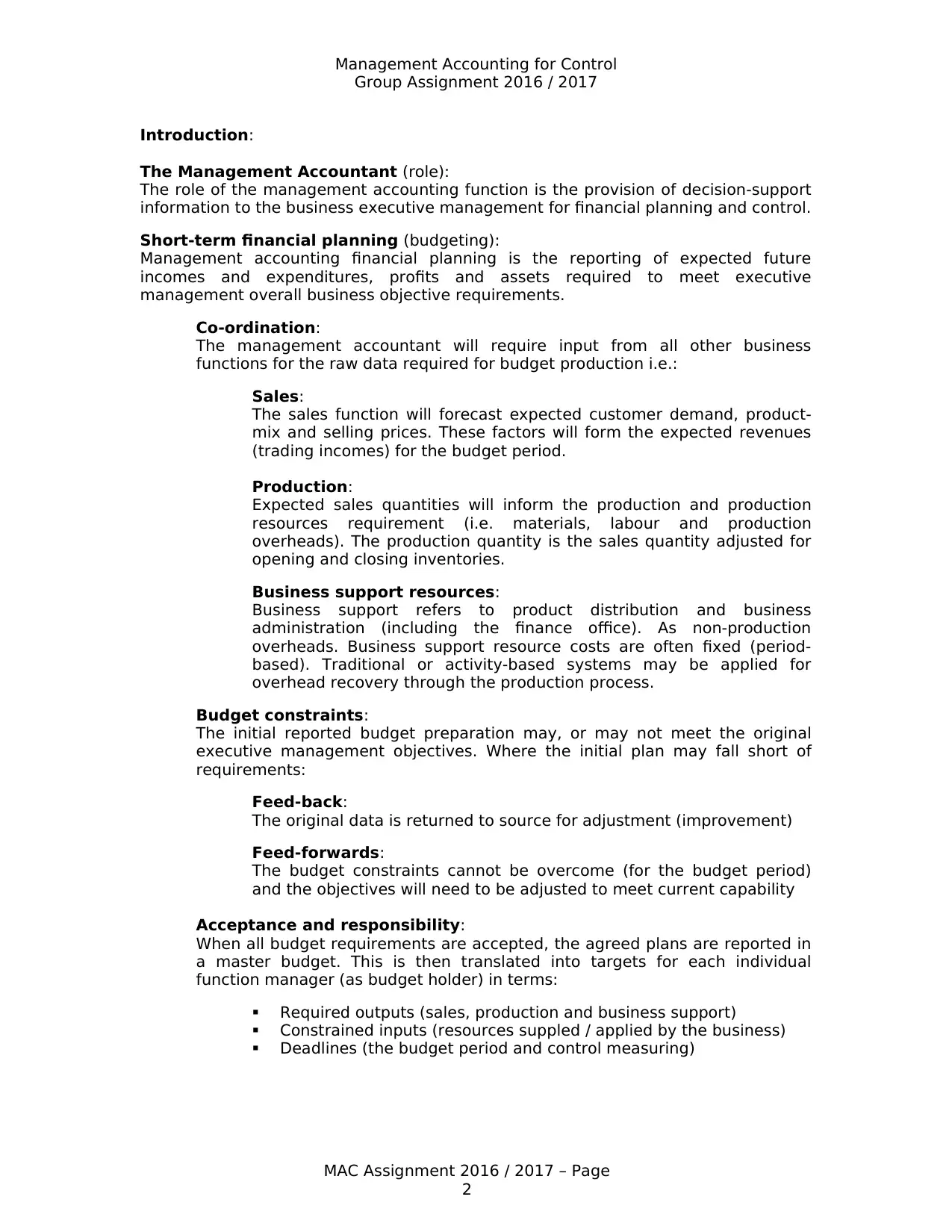
Management Accounting for Control
Group Assignment 2016 / 2017
Introduction:
The Management Accountant (role):
The role of the management accounting function is the provision of decision-support
information to the business executive management for financial planning and control.
Short-term financial planning (budgeting):
Management accounting financial planning is the reporting of expected future
incomes and expenditures, profits and assets required to meet executive
management overall business objective requirements.
Co-ordination:
The management accountant will require input from all other business
functions for the raw data required for budget production i.e.:
Sales:
The sales function will forecast expected customer demand, product-
mix and selling prices. These factors will form the expected revenues
(trading incomes) for the budget period.
Production:
Expected sales quantities will inform the production and production
resources requirement (i.e. materials, labour and production
overheads). The production quantity is the sales quantity adjusted for
opening and closing inventories.
Business support resources:
Business support refers to product distribution and business
administration (including the finance office). As non-production
overheads. Business support resource costs are often fixed (period-
based). Traditional or activity-based systems may be applied for
overhead recovery through the production process.
Budget constraints:
The initial reported budget preparation may, or may not meet the original
executive management objectives. Where the initial plan may fall short of
requirements:
Feed-back:
The original data is returned to source for adjustment (improvement)
Feed-forwards:
The budget constraints cannot be overcome (for the budget period)
and the objectives will need to be adjusted to meet current capability
Acceptance and responsibility:
When all budget requirements are accepted, the agreed plans are reported in
a master budget. This is then translated into targets for each individual
function manager (as budget holder) in terms:
Required outputs (sales, production and business support)
Constrained inputs (resources suppled / applied by the business)
Deadlines (the budget period and control measuring)
MAC Assignment 2016 / 2017 – Page
2
Group Assignment 2016 / 2017
Introduction:
The Management Accountant (role):
The role of the management accounting function is the provision of decision-support
information to the business executive management for financial planning and control.
Short-term financial planning (budgeting):
Management accounting financial planning is the reporting of expected future
incomes and expenditures, profits and assets required to meet executive
management overall business objective requirements.
Co-ordination:
The management accountant will require input from all other business
functions for the raw data required for budget production i.e.:
Sales:
The sales function will forecast expected customer demand, product-
mix and selling prices. These factors will form the expected revenues
(trading incomes) for the budget period.
Production:
Expected sales quantities will inform the production and production
resources requirement (i.e. materials, labour and production
overheads). The production quantity is the sales quantity adjusted for
opening and closing inventories.
Business support resources:
Business support refers to product distribution and business
administration (including the finance office). As non-production
overheads. Business support resource costs are often fixed (period-
based). Traditional or activity-based systems may be applied for
overhead recovery through the production process.
Budget constraints:
The initial reported budget preparation may, or may not meet the original
executive management objectives. Where the initial plan may fall short of
requirements:
Feed-back:
The original data is returned to source for adjustment (improvement)
Feed-forwards:
The budget constraints cannot be overcome (for the budget period)
and the objectives will need to be adjusted to meet current capability
Acceptance and responsibility:
When all budget requirements are accepted, the agreed plans are reported in
a master budget. This is then translated into targets for each individual
function manager (as budget holder) in terms:
Required outputs (sales, production and business support)
Constrained inputs (resources suppled / applied by the business)
Deadlines (the budget period and control measuring)
MAC Assignment 2016 / 2017 – Page
2
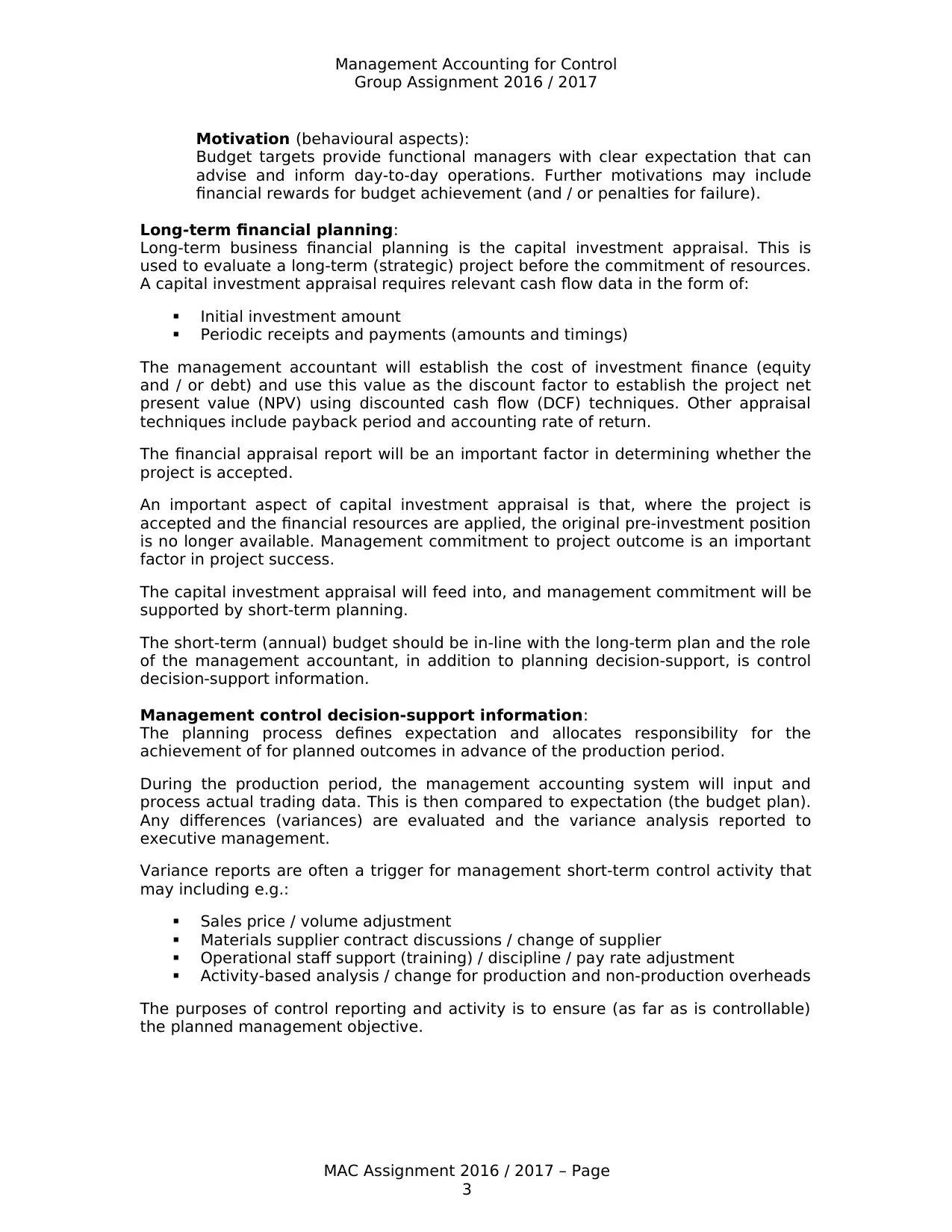
Management Accounting for Control
Group Assignment 2016 / 2017
Motivation (behavioural aspects):
Budget targets provide functional managers with clear expectation that can
advise and inform day-to-day operations. Further motivations may include
financial rewards for budget achievement (and / or penalties for failure).
Long-term financial planning:
Long-term business financial planning is the capital investment appraisal. This is
used to evaluate a long-term (strategic) project before the commitment of resources.
A capital investment appraisal requires relevant cash flow data in the form of:
Initial investment amount
Periodic receipts and payments (amounts and timings)
The management accountant will establish the cost of investment finance (equity
and / or debt) and use this value as the discount factor to establish the project net
present value (NPV) using discounted cash flow (DCF) techniques. Other appraisal
techniques include payback period and accounting rate of return.
The financial appraisal report will be an important factor in determining whether the
project is accepted.
An important aspect of capital investment appraisal is that, where the project is
accepted and the financial resources are applied, the original pre-investment position
is no longer available. Management commitment to project outcome is an important
factor in project success.
The capital investment appraisal will feed into, and management commitment will be
supported by short-term planning.
The short-term (annual) budget should be in-line with the long-term plan and the role
of the management accountant, in addition to planning decision-support, is control
decision-support information.
Management control decision-support information:
The planning process defines expectation and allocates responsibility for the
achievement of for planned outcomes in advance of the production period.
During the production period, the management accounting system will input and
process actual trading data. This is then compared to expectation (the budget plan).
Any differences (variances) are evaluated and the variance analysis reported to
executive management.
Variance reports are often a trigger for management short-term control activity that
may including e.g.:
Sales price / volume adjustment
Materials supplier contract discussions / change of supplier
Operational staff support (training) / discipline / pay rate adjustment
Activity-based analysis / change for production and non-production overheads
The purposes of control reporting and activity is to ensure (as far as is controllable)
the planned management objective.
MAC Assignment 2016 / 2017 – Page
3
Group Assignment 2016 / 2017
Motivation (behavioural aspects):
Budget targets provide functional managers with clear expectation that can
advise and inform day-to-day operations. Further motivations may include
financial rewards for budget achievement (and / or penalties for failure).
Long-term financial planning:
Long-term business financial planning is the capital investment appraisal. This is
used to evaluate a long-term (strategic) project before the commitment of resources.
A capital investment appraisal requires relevant cash flow data in the form of:
Initial investment amount
Periodic receipts and payments (amounts and timings)
The management accountant will establish the cost of investment finance (equity
and / or debt) and use this value as the discount factor to establish the project net
present value (NPV) using discounted cash flow (DCF) techniques. Other appraisal
techniques include payback period and accounting rate of return.
The financial appraisal report will be an important factor in determining whether the
project is accepted.
An important aspect of capital investment appraisal is that, where the project is
accepted and the financial resources are applied, the original pre-investment position
is no longer available. Management commitment to project outcome is an important
factor in project success.
The capital investment appraisal will feed into, and management commitment will be
supported by short-term planning.
The short-term (annual) budget should be in-line with the long-term plan and the role
of the management accountant, in addition to planning decision-support, is control
decision-support information.
Management control decision-support information:
The planning process defines expectation and allocates responsibility for the
achievement of for planned outcomes in advance of the production period.
During the production period, the management accounting system will input and
process actual trading data. This is then compared to expectation (the budget plan).
Any differences (variances) are evaluated and the variance analysis reported to
executive management.
Variance reports are often a trigger for management short-term control activity that
may including e.g.:
Sales price / volume adjustment
Materials supplier contract discussions / change of supplier
Operational staff support (training) / discipline / pay rate adjustment
Activity-based analysis / change for production and non-production overheads
The purposes of control reporting and activity is to ensure (as far as is controllable)
the planned management objective.
MAC Assignment 2016 / 2017 – Page
3
⊘ This is a preview!⊘
Do you want full access?
Subscribe today to unlock all pages.

Trusted by 1+ million students worldwide
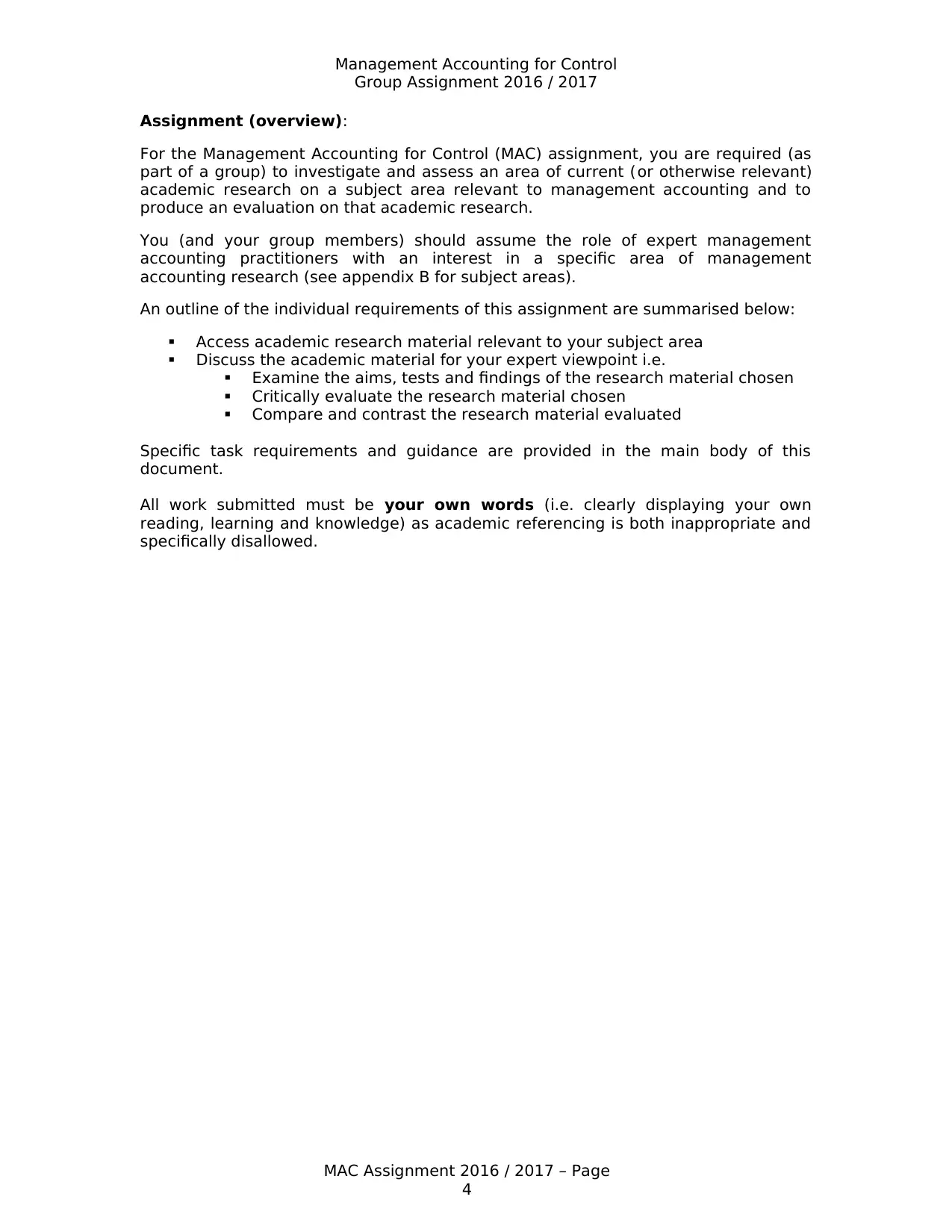
Management Accounting for Control
Group Assignment 2016 / 2017
Assignment (overview):
For the Management Accounting for Control (MAC) assignment, you are required (as
part of a group) to investigate and assess an area of current (or otherwise relevant)
academic research on a subject area relevant to management accounting and to
produce an evaluation on that academic research.
You (and your group members) should assume the role of expert management
accounting practitioners with an interest in a specific area of management
accounting research (see appendix B for subject areas).
An outline of the individual requirements of this assignment are summarised below:
Access academic research material relevant to your subject area
Discuss the academic material for your expert viewpoint i.e.
Examine the aims, tests and findings of the research material chosen
Critically evaluate the research material chosen
Compare and contrast the research material evaluated
Specific task requirements and guidance are provided in the main body of this
document.
All work submitted must be your own words (i.e. clearly displaying your own
reading, learning and knowledge) as academic referencing is both inappropriate and
specifically disallowed.
MAC Assignment 2016 / 2017 – Page
4
Group Assignment 2016 / 2017
Assignment (overview):
For the Management Accounting for Control (MAC) assignment, you are required (as
part of a group) to investigate and assess an area of current (or otherwise relevant)
academic research on a subject area relevant to management accounting and to
produce an evaluation on that academic research.
You (and your group members) should assume the role of expert management
accounting practitioners with an interest in a specific area of management
accounting research (see appendix B for subject areas).
An outline of the individual requirements of this assignment are summarised below:
Access academic research material relevant to your subject area
Discuss the academic material for your expert viewpoint i.e.
Examine the aims, tests and findings of the research material chosen
Critically evaluate the research material chosen
Compare and contrast the research material evaluated
Specific task requirements and guidance are provided in the main body of this
document.
All work submitted must be your own words (i.e. clearly displaying your own
reading, learning and knowledge) as academic referencing is both inappropriate and
specifically disallowed.
MAC Assignment 2016 / 2017 – Page
4
Paraphrase This Document
Need a fresh take? Get an instant paraphrase of this document with our AI Paraphraser
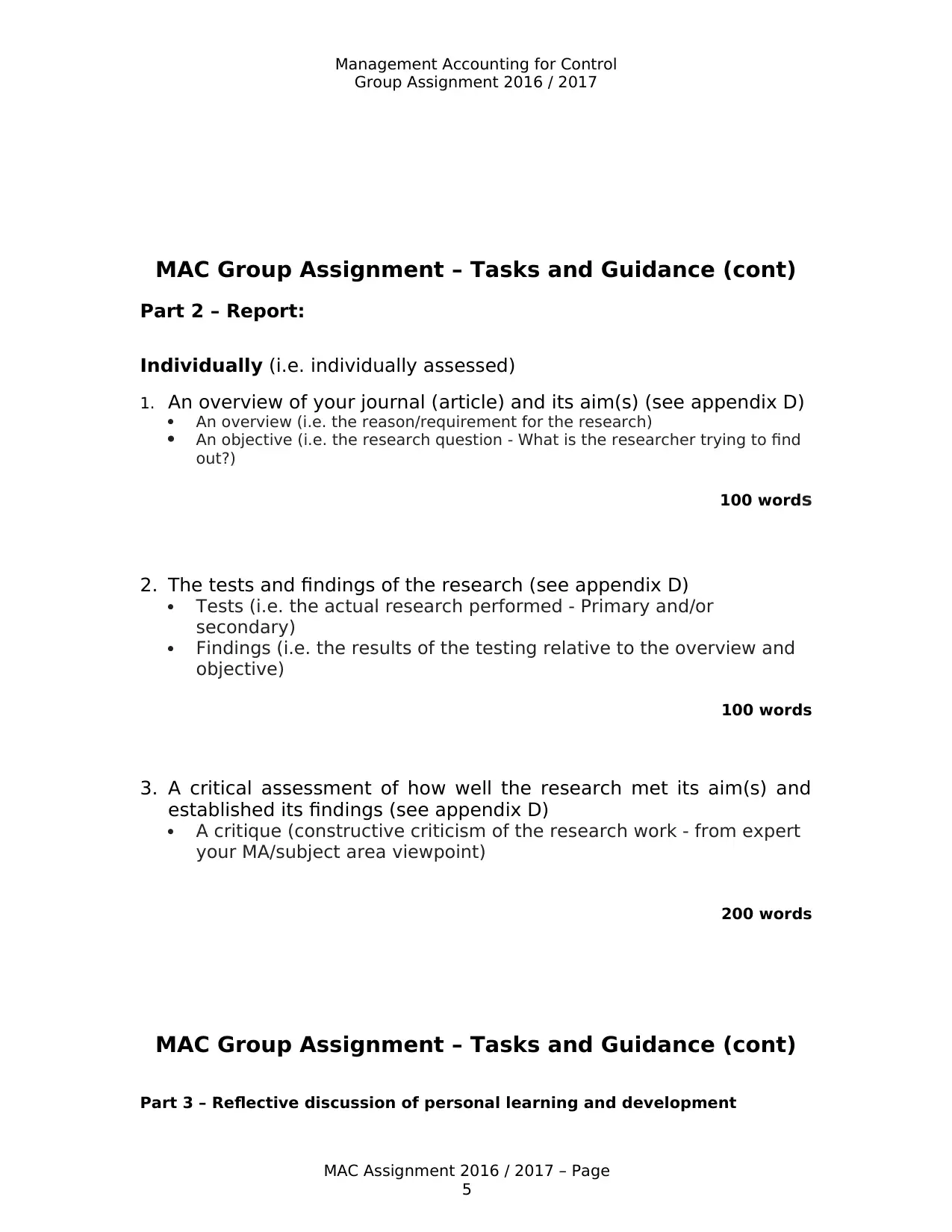
Management Accounting for Control
Group Assignment 2016 / 2017
MAC Group Assignment – Tasks and Guidance (cont)
Part 2 – Report:
Individually (i.e. individually assessed)
1. An overview of your journal (article) and its aim(s) (see appendix D)
An overview (i.e. the reason/requirement for the research)
An objective (i.e. the research question - What is the researcher trying to find
out?)
100 words
2. The tests and findings of the research (see appendix D)
Tests (i.e. the actual research performed - Primary and/or
secondary)
Findings (i.e. the results of the testing relative to the overview and
objective)
100 words
3. A critical assessment of how well the research met its aim(s) and
established its findings (see appendix D)
A critique (constructive criticism of the research work - from expert
your MA/subject area viewpoint)
200 words
MAC Group Assignment – Tasks and Guidance (cont)
Part 3 – Reflective discussion of personal learning and development
MAC Assignment 2016 / 2017 – Page
5
Group Assignment 2016 / 2017
MAC Group Assignment – Tasks and Guidance (cont)
Part 2 – Report:
Individually (i.e. individually assessed)
1. An overview of your journal (article) and its aim(s) (see appendix D)
An overview (i.e. the reason/requirement for the research)
An objective (i.e. the research question - What is the researcher trying to find
out?)
100 words
2. The tests and findings of the research (see appendix D)
Tests (i.e. the actual research performed - Primary and/or
secondary)
Findings (i.e. the results of the testing relative to the overview and
objective)
100 words
3. A critical assessment of how well the research met its aim(s) and
established its findings (see appendix D)
A critique (constructive criticism of the research work - from expert
your MA/subject area viewpoint)
200 words
MAC Group Assignment – Tasks and Guidance (cont)
Part 3 – Reflective discussion of personal learning and development
MAC Assignment 2016 / 2017 – Page
5
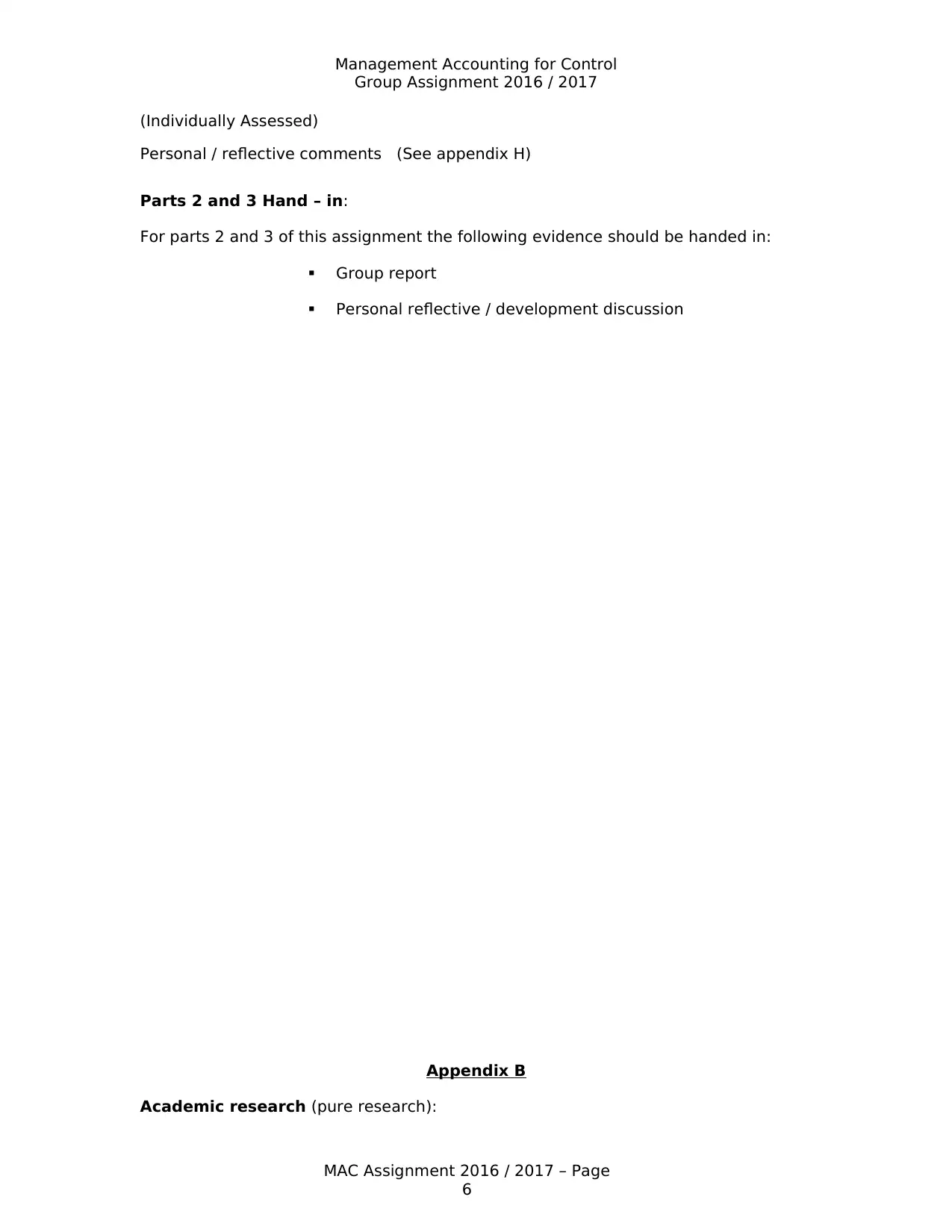
Management Accounting for Control
Group Assignment 2016 / 2017
(Individually Assessed)
Personal / reflective comments (See appendix H)
Parts 2 and 3 Hand – in:
For parts 2 and 3 of this assignment the following evidence should be handed in:
Group report
Personal reflective / development discussion
Appendix B
Academic research (pure research):
MAC Assignment 2016 / 2017 – Page
6
Group Assignment 2016 / 2017
(Individually Assessed)
Personal / reflective comments (See appendix H)
Parts 2 and 3 Hand – in:
For parts 2 and 3 of this assignment the following evidence should be handed in:
Group report
Personal reflective / development discussion
Appendix B
Academic research (pure research):
MAC Assignment 2016 / 2017 – Page
6
⊘ This is a preview!⊘
Do you want full access?
Subscribe today to unlock all pages.

Trusted by 1+ million students worldwide
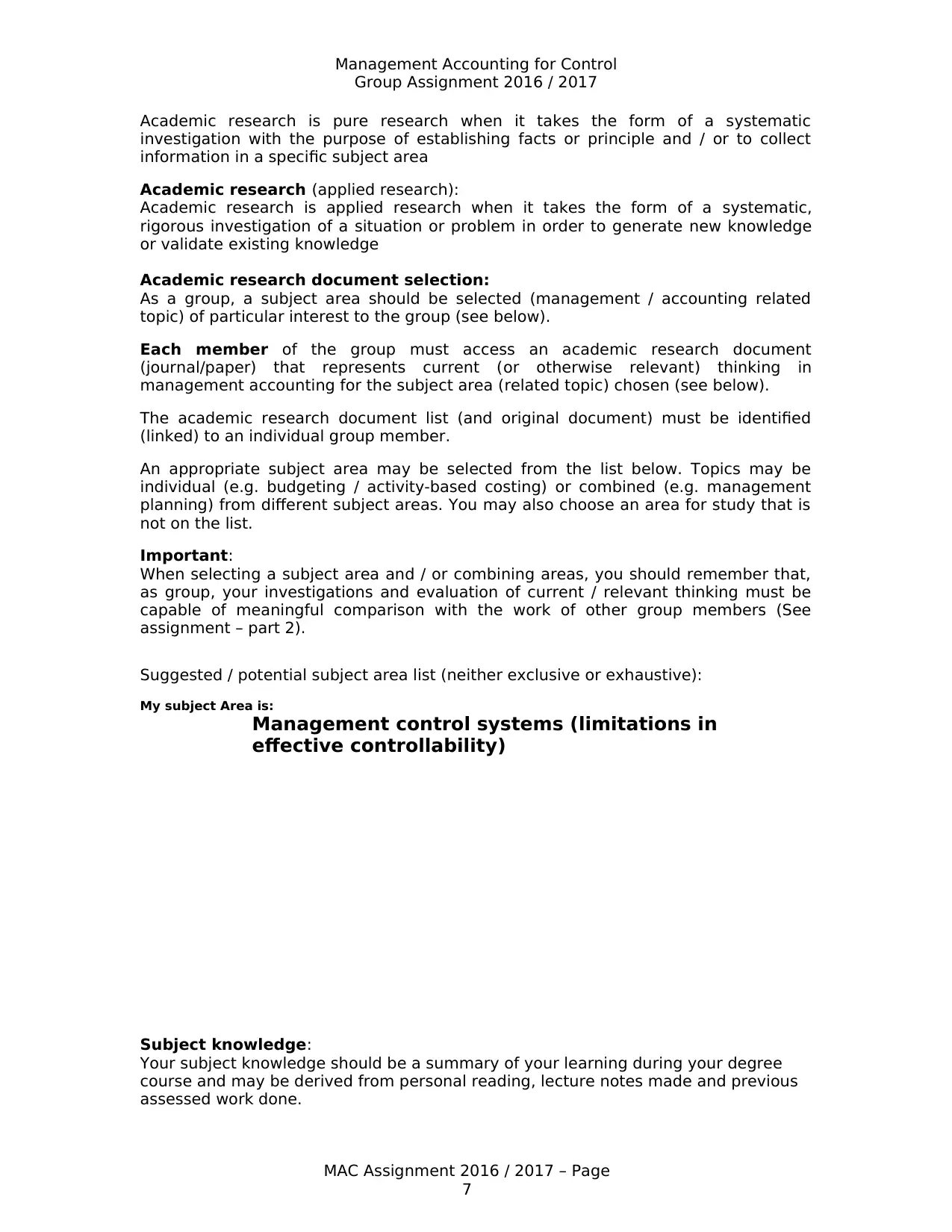
Management Accounting for Control
Group Assignment 2016 / 2017
Academic research is pure research when it takes the form of a systematic
investigation with the purpose of establishing facts or principle and / or to collect
information in a specific subject area
Academic research (applied research):
Academic research is applied research when it takes the form of a systematic,
rigorous investigation of a situation or problem in order to generate new knowledge
or validate existing knowledge
Academic research document selection:
As a group, a subject area should be selected (management / accounting related
topic) of particular interest to the group (see below).
Each member of the group must access an academic research document
(journal/paper) that represents current (or otherwise relevant) thinking in
management accounting for the subject area (related topic) chosen (see below).
The academic research document list (and original document) must be identified
(linked) to an individual group member.
An appropriate subject area may be selected from the list below. Topics may be
individual (e.g. budgeting / activity-based costing) or combined (e.g. management
planning) from different subject areas. You may also choose an area for study that is
not on the list.
Important:
When selecting a subject area and / or combining areas, you should remember that,
as group, your investigations and evaluation of current / relevant thinking must be
capable of meaningful comparison with the work of other group members (See
assignment – part 2).
Suggested / potential subject area list (neither exclusive or exhaustive):
My subject Area is:
Management control systems (limitations in
effective controllability)
Subject knowledge:
Your subject knowledge should be a summary of your learning during your degree
course and may be derived from personal reading, lecture notes made and previous
assessed work done.
MAC Assignment 2016 / 2017 – Page
7
Group Assignment 2016 / 2017
Academic research is pure research when it takes the form of a systematic
investigation with the purpose of establishing facts or principle and / or to collect
information in a specific subject area
Academic research (applied research):
Academic research is applied research when it takes the form of a systematic,
rigorous investigation of a situation or problem in order to generate new knowledge
or validate existing knowledge
Academic research document selection:
As a group, a subject area should be selected (management / accounting related
topic) of particular interest to the group (see below).
Each member of the group must access an academic research document
(journal/paper) that represents current (or otherwise relevant) thinking in
management accounting for the subject area (related topic) chosen (see below).
The academic research document list (and original document) must be identified
(linked) to an individual group member.
An appropriate subject area may be selected from the list below. Topics may be
individual (e.g. budgeting / activity-based costing) or combined (e.g. management
planning) from different subject areas. You may also choose an area for study that is
not on the list.
Important:
When selecting a subject area and / or combining areas, you should remember that,
as group, your investigations and evaluation of current / relevant thinking must be
capable of meaningful comparison with the work of other group members (See
assignment – part 2).
Suggested / potential subject area list (neither exclusive or exhaustive):
My subject Area is:
Management control systems (limitations in
effective controllability)
Subject knowledge:
Your subject knowledge should be a summary of your learning during your degree
course and may be derived from personal reading, lecture notes made and previous
assessed work done.
MAC Assignment 2016 / 2017 – Page
7
Paraphrase This Document
Need a fresh take? Get an instant paraphrase of this document with our AI Paraphraser
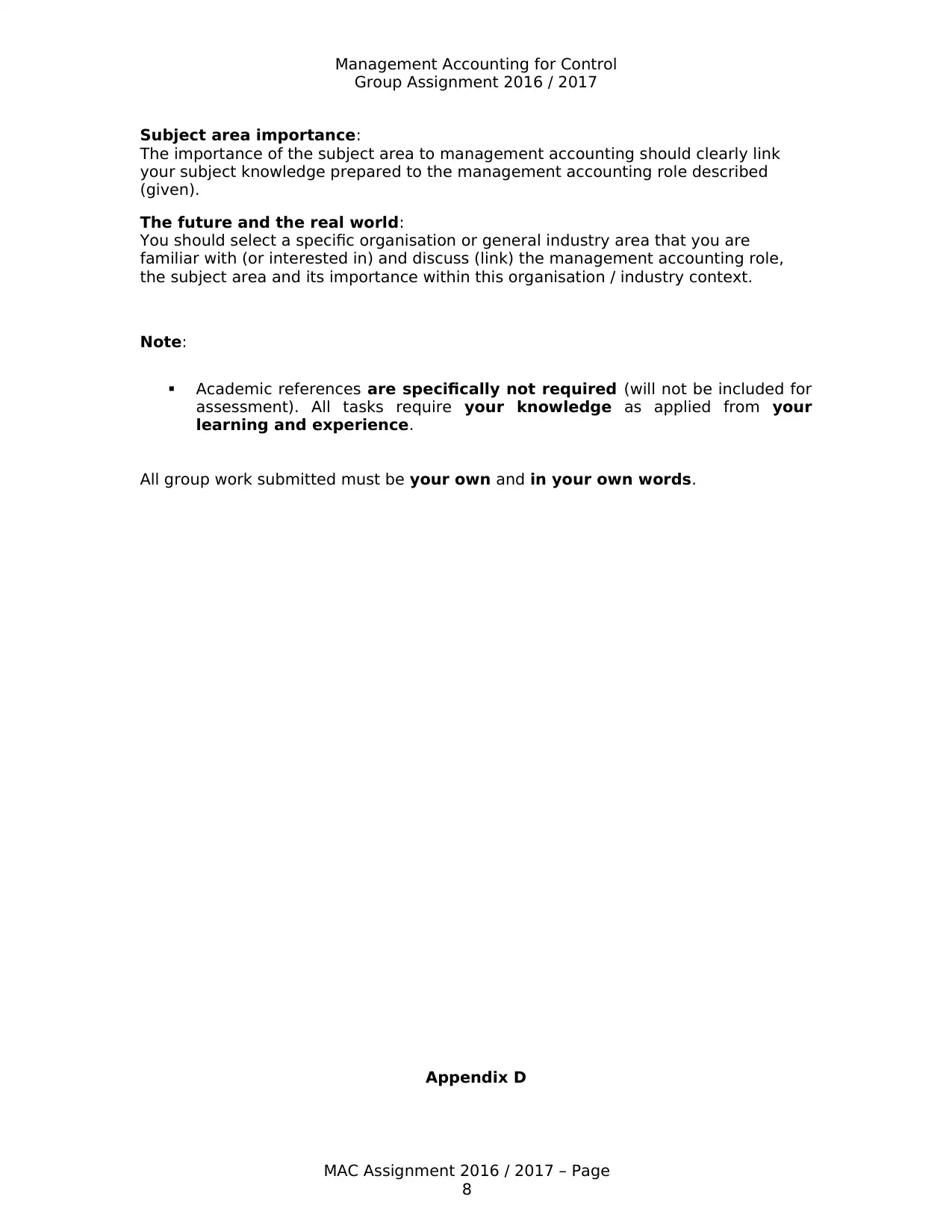
Management Accounting for Control
Group Assignment 2016 / 2017
Subject area importance:
The importance of the subject area to management accounting should clearly link
your subject knowledge prepared to the management accounting role described
(given).
The future and the real world:
You should select a specific organisation or general industry area that you are
familiar with (or interested in) and discuss (link) the management accounting role,
the subject area and its importance within this organisation / industry context.
Note:
Academic references are specifically not required (will not be included for
assessment). All tasks require your knowledge as applied from your
learning and experience.
All group work submitted must be your own and in your own words.
Appendix D
MAC Assignment 2016 / 2017 – Page
8
Group Assignment 2016 / 2017
Subject area importance:
The importance of the subject area to management accounting should clearly link
your subject knowledge prepared to the management accounting role described
(given).
The future and the real world:
You should select a specific organisation or general industry area that you are
familiar with (or interested in) and discuss (link) the management accounting role,
the subject area and its importance within this organisation / industry context.
Note:
Academic references are specifically not required (will not be included for
assessment). All tasks require your knowledge as applied from your
learning and experience.
All group work submitted must be your own and in your own words.
Appendix D
MAC Assignment 2016 / 2017 – Page
8
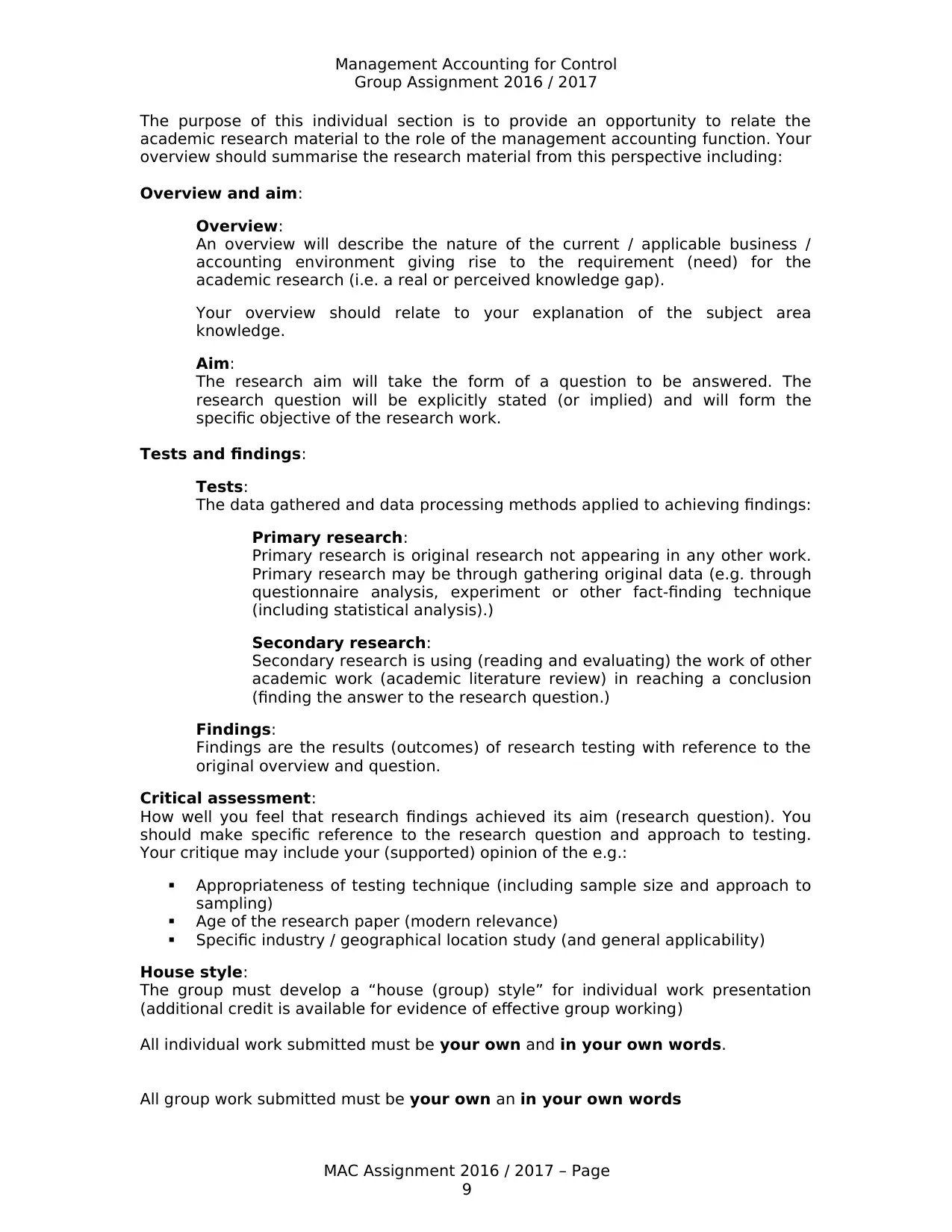
Management Accounting for Control
Group Assignment 2016 / 2017
The purpose of this individual section is to provide an opportunity to relate the
academic research material to the role of the management accounting function. Your
overview should summarise the research material from this perspective including:
Overview and aim:
Overview:
An overview will describe the nature of the current / applicable business /
accounting environment giving rise to the requirement (need) for the
academic research (i.e. a real or perceived knowledge gap).
Your overview should relate to your explanation of the subject area
knowledge.
Aim:
The research aim will take the form of a question to be answered. The
research question will be explicitly stated (or implied) and will form the
specific objective of the research work.
Tests and findings:
Tests:
The data gathered and data processing methods applied to achieving findings:
Primary research:
Primary research is original research not appearing in any other work.
Primary research may be through gathering original data (e.g. through
questionnaire analysis, experiment or other fact-finding technique
(including statistical analysis).)
Secondary research:
Secondary research is using (reading and evaluating) the work of other
academic work (academic literature review) in reaching a conclusion
(finding the answer to the research question.)
Findings:
Findings are the results (outcomes) of research testing with reference to the
original overview and question.
Critical assessment:
How well you feel that research findings achieved its aim (research question). You
should make specific reference to the research question and approach to testing.
Your critique may include your (supported) opinion of the e.g.:
Appropriateness of testing technique (including sample size and approach to
sampling)
Age of the research paper (modern relevance)
Specific industry / geographical location study (and general applicability)
House style:
The group must develop a “house (group) style” for individual work presentation
(additional credit is available for evidence of effective group working)
All individual work submitted must be your own and in your own words.
All group work submitted must be your own an in your own words
MAC Assignment 2016 / 2017 – Page
9
Group Assignment 2016 / 2017
The purpose of this individual section is to provide an opportunity to relate the
academic research material to the role of the management accounting function. Your
overview should summarise the research material from this perspective including:
Overview and aim:
Overview:
An overview will describe the nature of the current / applicable business /
accounting environment giving rise to the requirement (need) for the
academic research (i.e. a real or perceived knowledge gap).
Your overview should relate to your explanation of the subject area
knowledge.
Aim:
The research aim will take the form of a question to be answered. The
research question will be explicitly stated (or implied) and will form the
specific objective of the research work.
Tests and findings:
Tests:
The data gathered and data processing methods applied to achieving findings:
Primary research:
Primary research is original research not appearing in any other work.
Primary research may be through gathering original data (e.g. through
questionnaire analysis, experiment or other fact-finding technique
(including statistical analysis).)
Secondary research:
Secondary research is using (reading and evaluating) the work of other
academic work (academic literature review) in reaching a conclusion
(finding the answer to the research question.)
Findings:
Findings are the results (outcomes) of research testing with reference to the
original overview and question.
Critical assessment:
How well you feel that research findings achieved its aim (research question). You
should make specific reference to the research question and approach to testing.
Your critique may include your (supported) opinion of the e.g.:
Appropriateness of testing technique (including sample size and approach to
sampling)
Age of the research paper (modern relevance)
Specific industry / geographical location study (and general applicability)
House style:
The group must develop a “house (group) style” for individual work presentation
(additional credit is available for evidence of effective group working)
All individual work submitted must be your own and in your own words.
All group work submitted must be your own an in your own words
MAC Assignment 2016 / 2017 – Page
9
⊘ This is a preview!⊘
Do you want full access?
Subscribe today to unlock all pages.

Trusted by 1+ million students worldwide
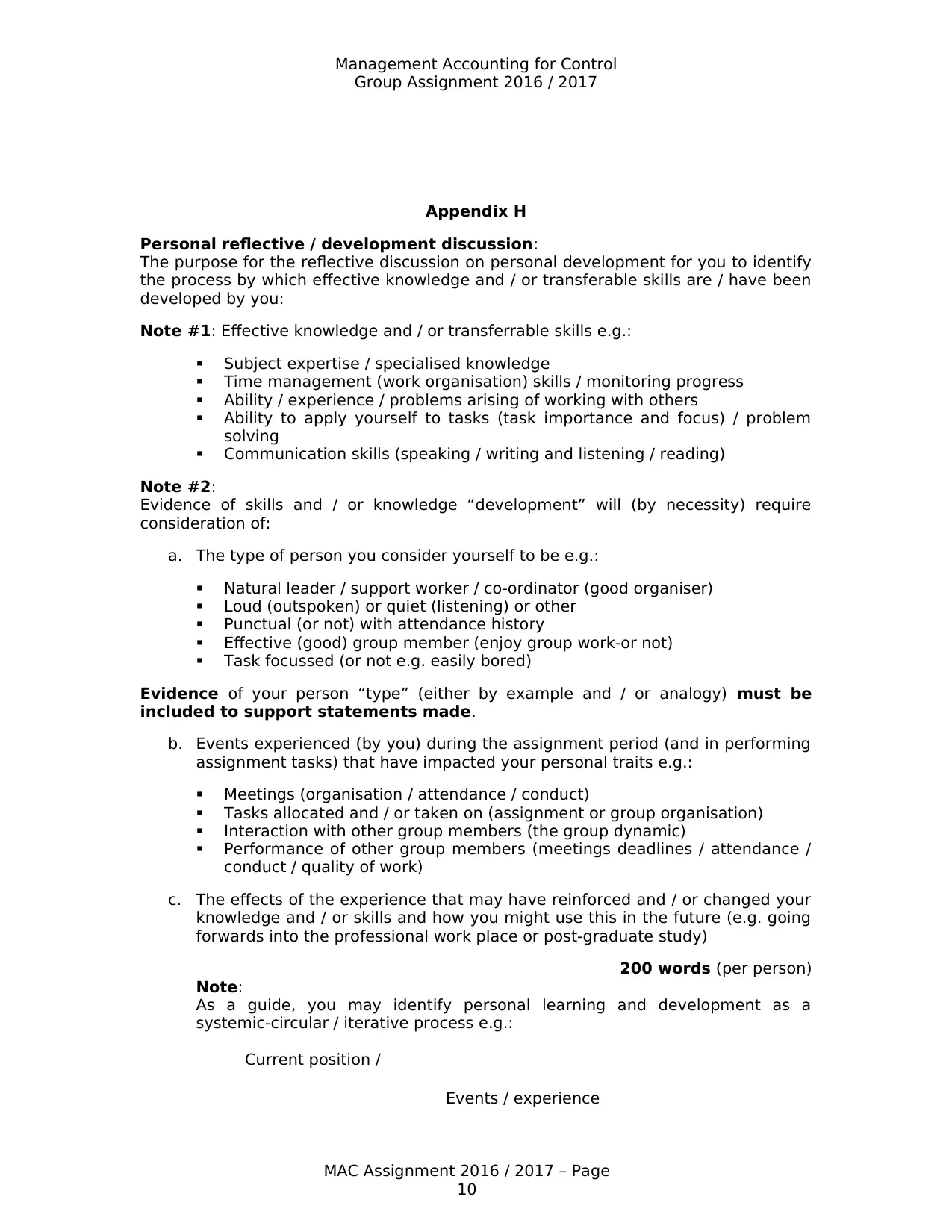
Management Accounting for Control
Group Assignment 2016 / 2017
Appendix H
Personal reflective / development discussion:
The purpose for the reflective discussion on personal development for you to identify
the process by which effective knowledge and / or transferable skills are / have been
developed by you:
Note #1: Effective knowledge and / or transferrable skills e.g.:
Subject expertise / specialised knowledge
Time management (work organisation) skills / monitoring progress
Ability / experience / problems arising of working with others
Ability to apply yourself to tasks (task importance and focus) / problem
solving
Communication skills (speaking / writing and listening / reading)
Note #2:
Evidence of skills and / or knowledge “development” will (by necessity) require
consideration of:
a. The type of person you consider yourself to be e.g.:
Natural leader / support worker / co-ordinator (good organiser)
Loud (outspoken) or quiet (listening) or other
Punctual (or not) with attendance history
Effective (good) group member (enjoy group work-or not)
Task focussed (or not e.g. easily bored)
Evidence of your person “type” (either by example and / or analogy) must be
included to support statements made.
b. Events experienced (by you) during the assignment period (and in performing
assignment tasks) that have impacted your personal traits e.g.:
Meetings (organisation / attendance / conduct)
Tasks allocated and / or taken on (assignment or group organisation)
Interaction with other group members (the group dynamic)
Performance of other group members (meetings deadlines / attendance /
conduct / quality of work)
c. The effects of the experience that may have reinforced and / or changed your
knowledge and / or skills and how you might use this in the future (e.g. going
forwards into the professional work place or post-graduate study)
200 words (per person)
Note:
As a guide, you may identify personal learning and development as a
systemic-circular / iterative process e.g.:
MAC Assignment 2016 / 2017 – Page
10
Current position /
status
Events / experience
Group Assignment 2016 / 2017
Appendix H
Personal reflective / development discussion:
The purpose for the reflective discussion on personal development for you to identify
the process by which effective knowledge and / or transferable skills are / have been
developed by you:
Note #1: Effective knowledge and / or transferrable skills e.g.:
Subject expertise / specialised knowledge
Time management (work organisation) skills / monitoring progress
Ability / experience / problems arising of working with others
Ability to apply yourself to tasks (task importance and focus) / problem
solving
Communication skills (speaking / writing and listening / reading)
Note #2:
Evidence of skills and / or knowledge “development” will (by necessity) require
consideration of:
a. The type of person you consider yourself to be e.g.:
Natural leader / support worker / co-ordinator (good organiser)
Loud (outspoken) or quiet (listening) or other
Punctual (or not) with attendance history
Effective (good) group member (enjoy group work-or not)
Task focussed (or not e.g. easily bored)
Evidence of your person “type” (either by example and / or analogy) must be
included to support statements made.
b. Events experienced (by you) during the assignment period (and in performing
assignment tasks) that have impacted your personal traits e.g.:
Meetings (organisation / attendance / conduct)
Tasks allocated and / or taken on (assignment or group organisation)
Interaction with other group members (the group dynamic)
Performance of other group members (meetings deadlines / attendance /
conduct / quality of work)
c. The effects of the experience that may have reinforced and / or changed your
knowledge and / or skills and how you might use this in the future (e.g. going
forwards into the professional work place or post-graduate study)
200 words (per person)
Note:
As a guide, you may identify personal learning and development as a
systemic-circular / iterative process e.g.:
MAC Assignment 2016 / 2017 – Page
10
Current position /
status
Events / experience
Paraphrase This Document
Need a fresh take? Get an instant paraphrase of this document with our AI Paraphraser
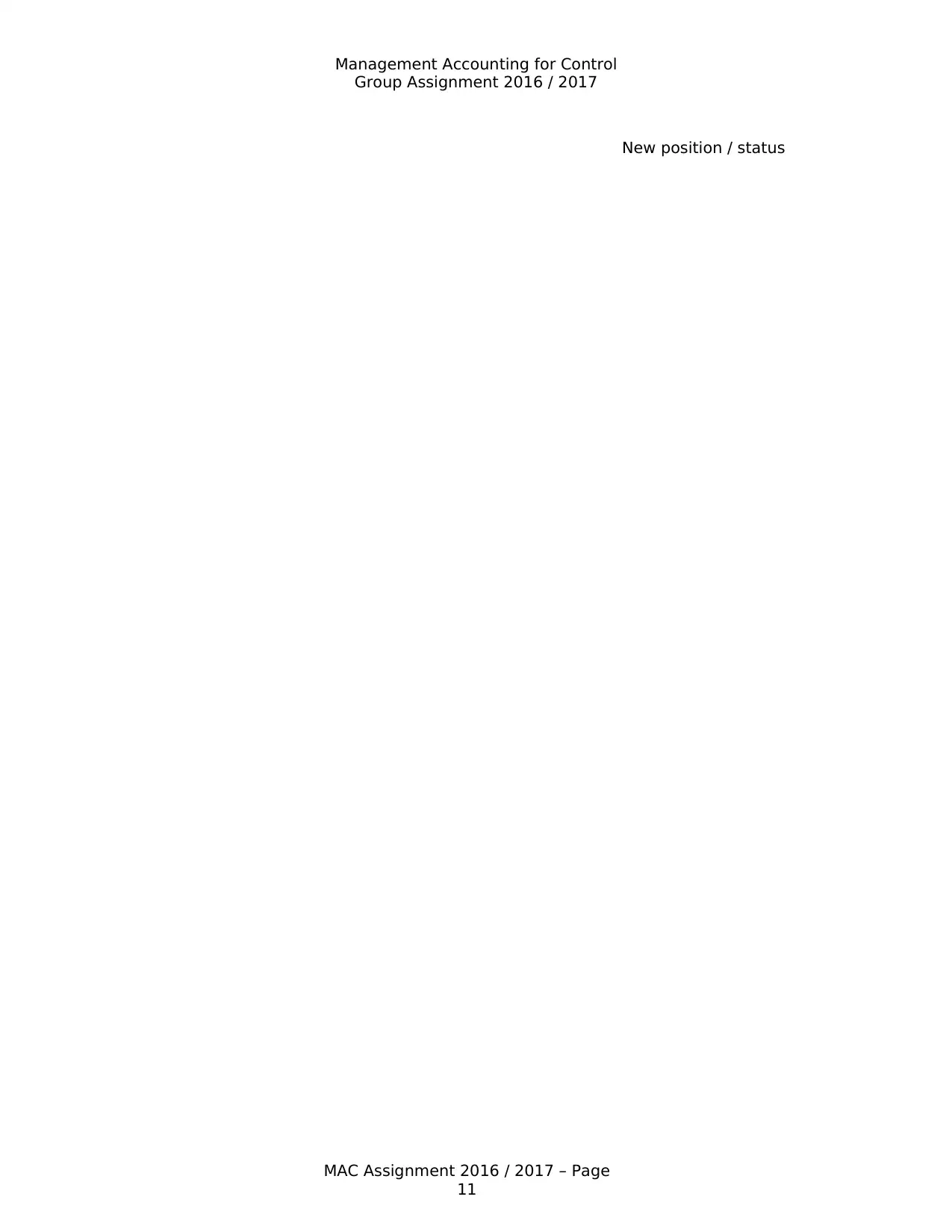
Management Accounting for Control
Group Assignment 2016 / 2017
MAC Assignment 2016 / 2017 – Page
11
New position / status
Group Assignment 2016 / 2017
MAC Assignment 2016 / 2017 – Page
11
New position / status
1 out of 11